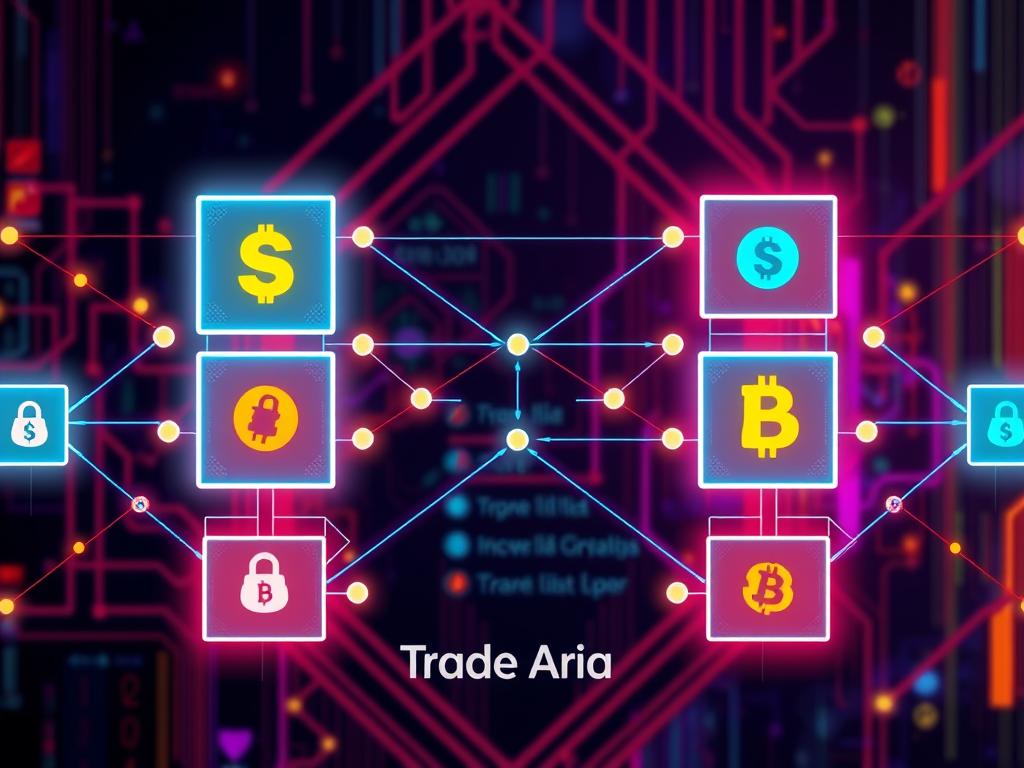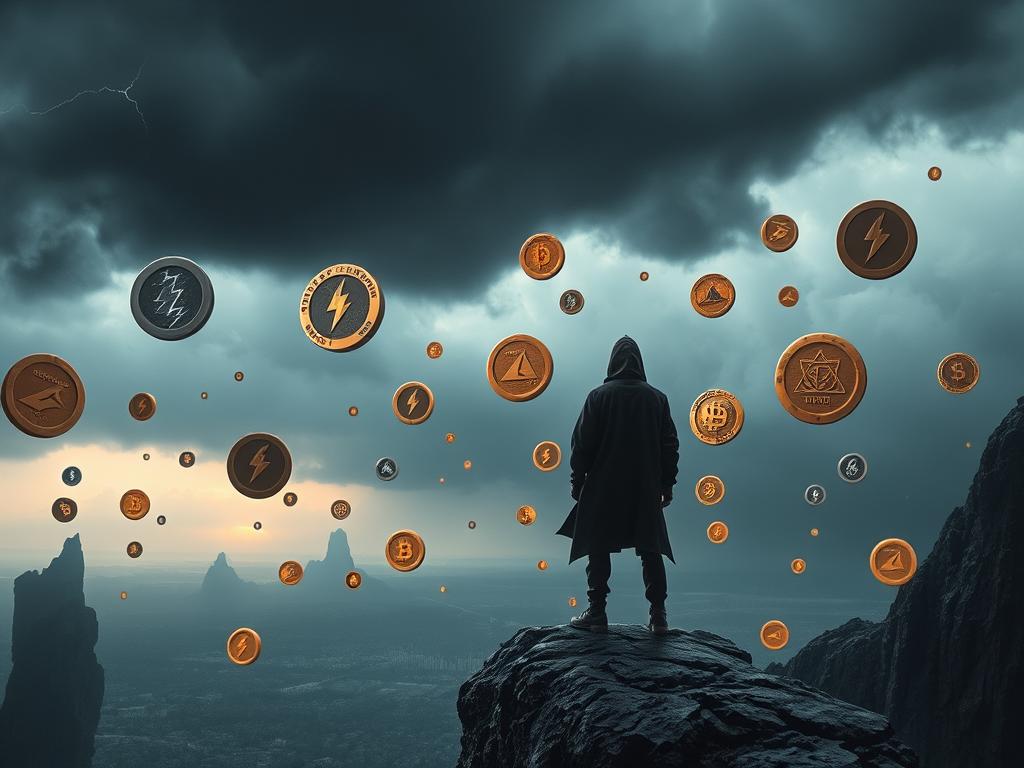Cryptocurrency is a digital money that doesn’t need a central authority to work. It’s a new way to do transactions securely and privately. Unlike regular money, it exists only online, with all transactions recorded on a public ledger called the blockchain.
This technology uses strong cryptography to make sure transactions are safe and fair. It lets people trade without needing banks or governments. This opens up new ways to do business and invest around the world.
If you’re curious about crypto trading or want to learn about cryptocurrency trading for beginners, this guide is for you. We’ll cover everything from how mining works to using crypto trading platforms. You’ll get the basics and tools to start your journey into cryptocurrency confidently.
What is Cryptocurrency?
Definition and Key Characteristics
Cryptocurrency is a digital payment system. It lets users buy things and exchange money without banks or credit card companies. Cryptocurrency uses blockchain technology for secure and open transactions in a decentralized system.
Some key traits of cryptocurrency are:
- Decentralization: Cryptocurrencies don’t rely on a central authority like governments or banks.
- Transparency: Transactions are recorded on a public ledger called the blockchain. This makes the system open and hard to alter.
- Security: Cryptocurrencies use advanced cryptography to keep transactions safe and sound.
- Accessibility: Anyone with internet can join cryptocurrency networks.
The most famous cryptocurrency is Bitcoin, launched in 2009. It’s the biggest digital currency by market value. Other big names include Ethereum, Litecoin, and Ripple.
“Cryptocurrency is a digital asset designed to work as a medium of exchange wherein individual coin ownership records are stored in a ledger existing in a form of a computerized database.”
How Does Cryptocurrency Work?
Cryptocurrencies are different from traditional money. They use blockchain technology, a digital ledger that keeps track of all transactions. When you make a payment, computers on the blockchain network check if it’s valid.
Once it’s confirmed, the transaction is added to the blockchain. This acts as a public record of the exchange.
The validation process is key to cryptocurrencies. It makes sure transactions are safe and can’t be spent twice. There are two main ways to validate transactions: Proof of Work and Proof of Stake.
| Proof of Work | Proof of Stake |
|---|---|
| In this method, miners use powerful computers to solve complex problems. They compete to validate transactions and add them to the blockchain. The first miner to solve the problem gets new cryptocurrency units. | Proof of Stake involves validators using their own cryptocurrency to validate transactions. The more tokens a validator has, the higher their chance of being chosen to validate a block and earn a reward. |
The blockchain technology is what makes cryptocurrencies decentralized. Instead of a central authority, a network of users controls the currency. This creates a secure and transparent system for digital transactions.
“Cryptocurrencies represent the future of money, empowering individuals to take control of their financial lives and participate in a truly global economy.”
Types of Cryptocurrencies
In the last 15 years, the cryptocurrency world has grown a lot. Today, there are about 10,000 different digital currencies. Bitcoin, launched in 2009, is still the most valuable one.
Other popular cryptocurrencies, called altcoins, have come up to meet different needs. Examples include Litecoin, XRP, Ethereum, Cardano, and Polkadot. These altcoins aim to improve on Bitcoin or serve specific purposes.
Stablecoins like Tether and USD Coin are another type. They keep their value stable, usually tied to a traditional currency like the U.S. dollar. This makes them a safer choice than other cryptocurrencies.
There are also utility tokens and security tokens. Utility tokens give access to blockchain functions, while security tokens represent real-world assets. The rise of decentralized finance (DeFi) has led to DeFi tokens for financial services. Recently, non-fungible tokens (NFTs) have also appeared, allowing for unique digital assets on the blockchain.
The cryptocurrency market is still growing. This means more digital currencies will come, offering choices for investors, users, and developers.
| Cryptocurrency | Key Characteristics |
|---|---|
| Bitcoin (BTC) | The first and most valuable cryptocurrency, known for its decentralized nature and limited supply. |
| Ethereum (ETH) | The second-largest cryptocurrency, known for its smart contract functionality and decentralized applications. |
| Litecoin (LTC) | Often referred to as the “silver to Bitcoin’s gold,” offering faster transactions and lower fees. |
| Tether (USDT) | A stablecoin pegged to the U.S. dollar, providing stability in the volatile cryptocurrency market. |
| Cardano (ADA) | A blockchain platform focused on scalability and security, utilizing a proof-of-stake consensus mechanism. |
“The limit for Bitcoin creation is set at 21 million units, after which no more Bitcoins will be generated.”
cryptocurrency for beginners
If you’re new to cryptocurrency, it’s key to learn the basics first. Cryptocurrencies are digital assets that can change value quickly. This change can offer chances for profit but also risks. It’s important to know what you’re getting into and only invest what you can lose.
The cryptocurrency market is huge and growing fast. Bitcoin, the biggest one, is worth over $1 trillion. The whole market is now over $2 trillion. This growth has caught the eye of big investors and regular people, making the market even bigger.
But, the volatility of cryptocurrencies can be tricky. Prices can change a lot, leading to big wins or big losses. To handle this, you need to understand the market, how to trade, and how to manage risks.
When you start investing in cryptocurrency, learn about different types like Bitcoin, Ethereum, Tether, Solana, and Binance Coin. Each has its own special features and uses. You need to study them well before deciding to invest.
Remember, cryptocurrency for beginners is complex and always changing. By learning, managing risks, and only investing what you can afford to lose, you can make the most of this market.
“Cryptocurrencies are enormously volatile, and that volatility can create opportunities for profit if you’re looking to trade these digital assets. However, the volatility can also lead to substantial losses, especially for inexperienced investors.”
Benefits of Cryptocurrency
Decentralization and Security
Cryptocurrency is special because it’s not controlled by governments or banks. It runs on a network that doesn’t need middlemen. This means more security, privacy, and cheaper, faster global payments.
Transactions in cryptocurrency are safe thanks to special codes. The blockchain, a shared ledger, keeps all deals open and safe from tampering. This makes the whole system secure.
Also, you can keep your financial life private with cryptocurrency. You don’t have to share personal info, which helps avoid scams and identity theft. This is great for those who want to control their money better.
Lastly, cryptocurrencies make sending money across the world quick and cheap. They can settle in minutes, costing much less than traditional methods. This is a big win for people and businesses that deal with money internationally.
“Cryptocurrencies have the potential to revolutionize the way we think about and use money, offering a secure, transparent, and accessible financial system that empowers individuals and businesses alike.”
In summary, the advantages of cryptocurrency, like decentralization and security, make it a strong choice. It’s especially good for those who want more control over their money and easier global transactions.
Risks and Challenges of Cryptocurrency
Cryptocurrencies have potential benefits but also come with big risks. The market is very volatile, with prices changing fast. This can lead to big losses for new investors. The North American Securities Administrators Association (NASAA) says investments in cryptocurrencies are a big threat to investors in 2022.
The market also lacks regulation, making it risky for investors. Scammers use fake reviews to trick people into scams. Investors should watch out for promises of quick profits, as these are often scams.
Wallets and exchanges can be hacked, leading to lost funds. Social media has more people sharing financial advice, including on cryptocurrencies. But, this advice is not always reliable.
- Investors should be careful and research companies or ICOs well before investing.
- Regulatory bodies suggest searching online for reviews, scams, or complaints before investing in a cryptocurrency or company.
With over 10,000 cryptocurrencies, the market is complex and scary for beginners. The FTC and NASAA offer resources to help understand cryptocurrency and avoid scams. They provide tips on social media, online trading, and investing to protect against fraud.
| Cryptocurrency Risks | Comparison |
|---|---|
| Volatility: The price of Ethereum doubled from July 2021 to December 2021 and then dropped over 70% since Christmas 2021. | The London Stock Exchange was founded in 1801, showcasing centuries of stock market history compared to cryptocurrencies that have been around for just over a decade. |
| Lack of regulation: Scammers often use positive, yet fake client reviews to lure victims into fraudulent schemes related to cryptocurrencies. | Bitcoin, with 21 million coins cap, is widely accepted for payments and is considered the market leader, but its blockchain infrastructure slows down beyond seven transactions per second, in comparison to Visa’s 1,700 transactions per second processing capability. |
Understanding the risks and challenges of cryptocurrency is key. It requires careful research, caution, and knowledge of the market’s volatility and lack of regulation. By staying informed and taking proactive steps, investors can make better decisions and reduce risks in this fast-changing financial world.
“Investors should be cautious of promises of guaranteed returns or profits in a short period, as these are often signs of investment fraud in the cryptocurrency sector.”
Mining and Validation Process
The heart of the cryptocurrency world is the mining and validation process. It keeps the blockchain safe and reliable. This process uses special hardware and software to add transactions and check the network.
Proof of Work and Proof of Stake
There are two main ways to validate in the crypto world: Proof of Work (PoW) and Proof of Stake (PoS). In PoW, miners race to solve hard math problems. The first one to solve gets the reward in cryptocurrency. This method uses a lot of energy because it needs a lot of computing power.
PoS, on the other hand, lets validators use their own cryptocurrency to check transactions. The more they stake, the better their chance to earn rewards. PoS is seen as more energy-friendly than PoW because it doesn’t need as much computing power.
- The reward for mining a Bitcoin block was 6.25 BTC as of March 8, 2024, with a value of $426,781.25 at a bitcoin price of $68,285.
- Bitcoin mining rewards are halved every four years, starting from 50 BTC in 2009. They are expected to halve to 3.125 BTC in April 2024.
- The mining difficulty level on March 9, 2024, was 79.35 trillion. This means it’s 1 in 79.35 trillion for a computer to make a hash below the target.
PoW and PoS both aim to keep the blockchain safe. But they use different amounts of energy and reward participants differently. The crypto community is still debating which method is better, with each having its own pros and cons.
Cryptocurrency Trading and Investing
Cryptocurrency trading and investing can be exciting but also complex. As a beginner, it’s important to know the risks and details of the market. The market is very volatile, with prices changing quickly. This can lead to big gains or losses.
To start trading, you need to pick a good cryptocurrency trading platform or crypto exchange. Popular choices include Plus500, eToro, Robinhood, Coinbase, and Uphold. Each offers different cryptocurrencies and fees. After choosing a platform, you’ll need to create an account, verify your identity, and fund it with debit cards, wire transfers, or ACH deposits.
There are different cryptocurrency trading strategies to consider, like day trading, HODLing, and swing trading. Each has its own risks and rewards. It’s key to research and understand your risk level before investing.
| Cryptocurrency Trading Platform | Recommended for Beginners | Transaction Fees | Supported Cryptocurrencies |
|---|---|---|---|
| eToro | Yes | 0.00% – 0.75% | 50+ |
| Coinbase | Yes | 0.00% – 0.60% | 5,500+ |
| Kraken | Yes | 0.00% – 0.40% | 200+ |
| Crypto.com | Yes | 0.00% – 0.075% | 350+ |
| Gemini | Yes | 0.00% – 0.40% | 80+ |
It’s crucial to diversify your investments and only invest what you can afford to lose. The cryptocurrency market is speculative and unpredictable. By understanding the market, managing risks, and using the right tools and strategies, you can trade and invest with confidence as a beginner.
“Cryptocurrency trading is not suitable for all investors due to the number of risks involved.”
Cryptocurrency Wallets and Storage
When you start with cryptocurrency, keeping your digital assets safe is key. Cryptocurrency wallets act like digital wallets, protecting your crypto. They come in different types, each with its own benefits for cryptocurrency wallets, hot wallets, cold wallets, and secure storage.
Hot wallets are online and easy to use, but they’re at risk of cyber-attacks. Cold wallets, like USB drives, are offline and safer, but you need to keep your access key safe.
Choosing the right wallet depends on how often you trade, how much crypto you have, and how secure you want it. For quick trades or small amounts, software wallets might work. But for big amounts, hardware wallets are safer because they’re more secure.
| Wallet Type | Advantages | Disadvantages |
|---|---|---|
| Hot Wallet |
|
|
| Cold Wallet |
|
|
The choice between hot and cold wallets depends on your needs and how much risk you’re willing to take. Beginners might prefer software wallets for ease of use. But for more security, experienced users often choose hardware wallets. No matter your choice, make sure it fits your security needs and investment plan.
Regulatory Landscape and Taxation
The world of cryptocurrency is growing fast, but the rules around it are getting more complicated. Different countries have their own ways of handling cryptocurrency regulations. Some welcome it, while others have strict rules or even ban it.
When it comes to cryptocurrency taxation, the US is a key player. The IRS says cryptocurrencies are treated like property. This means investors have to pay capital gains taxes on them. It’s important for investors to keep track of their trades and report any profits or losses.
Varying Regulations Across Countries
Cryptocurrency rules change a lot from one global region to another. For example, El Salvador has made Bitcoin legal money, but China has banned it. In the US, the SEC and CFTC are busy making sure the market is fair and safe. They watch out for scams, keep data safe, and figure out if digital assets are securities.
| Country | Cryptocurrency Regulation | Taxation |
|---|---|---|
| United States | Cryptocurrencies are treated as property, with the IRS providing guidance on reporting and taxation. | Capital gains taxes apply to cryptocurrency investments, with specific requirements for tracking cost basis and reporting transactions. |
| China | Cryptocurrency trading and mining have been banned, with a crackdown on related activities. | China treats cryptocurrencies as “virtual commodities” and subjects them to capital gains taxes. |
| El Salvador | Bitcoin has been adopted as legal tender, with the government providing digital wallets and incentives for its use. | El Salvador does not currently impose any taxes on Bitcoin transactions or holdings. |
As cryptocurrency regulations and taxation rules keep changing, it’s vital for everyone to keep up. Investors and businesses need to know and follow the laws in their area.
Future of Cryptocurrency
The future of cryptocurrency is a topic of much debate and speculation. As the technology continues to evolve, it has the potential to disrupt traditional financial systems. It could change how we conduct transactions and store value.
Blockchain technology is a key driver of cryptocurrency’s future. Its decentralized and secure nature could revolutionize industries like finance and supply chain management. It could also change how we manage digital identities.
Regulatory clarity will also shape the future of cryptocurrency. Governments are exploring their own digital currencies to compete with private ones. By January 2024, 130 countries, including the United States, were considering their own central bank digital currencies.
The success of cryptocurrencies depends on security, scalability, and acceptance. The collapse of TerraUSD in 2022 showed the need for stability and regulation. Despite challenges, the future looks promising.
As more people and institutions embrace digital assets, the financial sector could see significant disruption and innovation. Cryptocurrencies and blockchain technology have the power to reshape the global financial landscape. But, the path forward requires careful navigation and responsible development.
| Cryptocurrency Trend | 2021 | 2022 | 2024 |
|---|---|---|---|
| Bitcoin (BTC) | Positive | Bearish | -2.01% |
| Ethereum (ETH) | Positive | Bearish | -3.14% |
| Adoption Rate | Increased | Slowed | 17% of U.S. adults |
“The future of cryptocurrency is unpredictable, but the potential for disruption and innovation is undeniable. As the technology matures and regulatory frameworks evolve, we can expect to see significant changes in the global financial landscape.”
While the future of cryptocurrency remains uncertain, one thing is clear: the cryptocurrency and blockchain landscape will continue to evolve. This will present both opportunities and challenges for investors, businesses, and policymakers alike.
Getting Started with Cryptocurrency
A Step-by-Step Guide
Starting with cryptocurrency can feel overwhelming for beginners. But, with the right help, you can easily begin your journey. We’ll guide you through the key steps to start investing in cryptocurrency.
First, pick a trustworthy crypto exchange or brokerage platform. Look at the variety of cryptocurrencies they offer, their security, and fees. Coinbase, Binance, and Kraken are good choices for new investors.
Then, create your crypto wallet to keep your digital assets safe. You can choose between a hot wallet (online) or a cold wallet (offline) based on your needs and security level.
- Research and pick the cryptocurrency you want to invest in, like Bitcoin or Ethereum.
- Use traditional payment methods like bank transfers or debit cards to fund your account.
- Make your first cryptocurrency purchase and watch how it does.
Remember, investing in cryptocurrency has risks. It’s important to do your homework, start small, and learn about the market before growing your portfolio. Stay updated, use reliable sources, and always protect your digital assets.
“Investing in cryptocurrency is like navigating uncharted waters, but with the right mindset and a solid plan, you can unlock the potential of this exciting asset class.”
| Crypto Exchange | Fees | Security | Cryptocurrencies Offered |
|---|---|---|---|
| Coinbase | 0.5% – 4% | Highly secure with 2FA and insurance | Bitcoin, Ethereum, Dogecoin, and over 100 other coins |
| Binance | 0.1% – 0.5% | Robust security measures, including 2FA and cold storage | Thousands of cryptocurrencies, including major and altcoins |
| Kraken | 0.16% – 0.26% | Highly regulated and audited for security | Bitcoin, Ethereum, Litecoin, and over 50 other cryptocurrencies |
Resources for Further Learning
Exploring the world of cryptocurrency is exciting. There are many educational resources to help you learn more. Whether you’re just starting or want to learn more, these resources will guide you.
Online Courses and Programs
For beginners, some great online courses include:
- “Bitcoin and Cryptocurrency Technologies” – an online course by Princeton University that covers Bitcoin and cryptocurrency basics.
- “Blockchain and Cryptocurrency Explained” – a beginner course from the University of Michigan that teaches blockchain and cryptocurrency basics.
- The Complete Cryptocurrency Investment Course – a Udemy course with over 12.5 hours of video. It teaches investment strategies and portfolio management in crypto.
- Cryptocurrency Fundamentals – a Udemy course with more than two hours of video. It covers the core concepts of cryptocurrencies and blockchain technology.
These courses will give you a solid foundation in cryptocurrency and blockchain. This knowledge will help you make better investment decisions.
Online Resources and Communities
There are also many online resources and communities to keep you updated:
- Reputable cryptocurrency news and analysis websites, such as CoinDesk, Cointelegraph, and Decrypt, offer valuable insights and news.
- Crypto-focused social media platforms, like Twitter, provide real-time information and discussions with industry leaders.
- Online forums, such as Reddit’s r/CryptoCurrency, are great for asking questions, sharing experiences, and discussing with others.
By using these resources, you can deepen your understanding of the cryptocurrency world. You’ll also stay updated on the latest developments.
No matter your current knowledge level, there are many opportunities to learn in the world of cryptocurrency. By using these educational resources, you can confidently explore the dynamic and exciting world of digital assets and blockchain technology.
Conclusion
Cryptocurrency is a complex and fast-changing financial technology. It offers both chances and challenges for investors. As a beginner, it’s key to understand how it works, the different types, and the risks and benefits.
Learning, managing risk, and starting small can help you explore cryptocurrency. This way, you can benefit from its growth while being ready for its ups and downs. Important points include its decentralized nature, fast and secure transactions, and the chance for more people to access finance.
But, there are also risks like price swings, regulatory issues, and environmental worries. As cryptocurrency grows, the blockchain technology behind it keeps improving. This can change traditional finance in big ways.
By staying updated and taking a balanced view, beginners can make the most of this new financial world. This way, they can benefit from the exciting changes brought by cryptocurrency.
FAQ
What is cryptocurrency?
Cryptocurrency is a digital way to pay for things without using cash. It’s only digital and is watched over by a network of users. This network uses strong encryption to keep everything safe.
How does cryptocurrency work?
When you make a payment with crypto, computers check if it’s okay. If it is, they add it to a digital ledger. This ledger keeps track of all transactions.
What are the different types of cryptocurrencies?
Bitcoin was the first and is the most popular. Ethereum is the second most valuable. Other types include altcoins like Cardano and Dogecoin. Stablecoins, like Tether, keep their value steady.
What are the benefits of cryptocurrency?
Cryptocurrency offers privacy and doesn’t need personal info for purchases. It’s global, so no foreign exchange rates. It’s also secure, thanks to strong encryption.
What are the risks and challenges of cryptocurrency?
Prices can change fast, leading to big losses. The market has little regulation, making scams common. Wallets and exchanges can be hacked, risking your money.
How does the mining process work?
Mining creates new cryptocurrency. It uses special hardware and software to add transactions to the blockchain. There are two main ways: Proof of Work and Proof of Stake.
How can I start investing in cryptocurrency?
First, pick a broker or exchange. Then, create and fund your account. Next, buy your first cryptocurrency. Consider fees, security, and available cryptocurrencies. Choose a wallet to store your assets safely.
Where can I learn more about cryptocurrency?
Online courses from Princeton and Michigan University are great resources. They help you understand cryptocurrency and make better investment choices.





